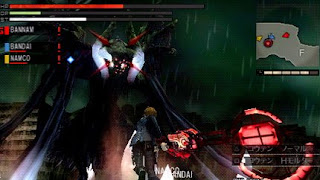
It's easy to see the similarities between Capcom's massively popular Monster Hunter and Namco Bandai's latest third-person action role-playing game God Eater. Both feature protagonists sent on quests to hunt down huge creatures, with oversized weaponry, real-time combat, and an experience clearly geared towards playing with friends cooperatively. Despite this, God Eater introduces a number of features that set it apart from Monster Hunter, such as a postapocalyptic setting, lock-on targeting, and multiple weapon modes. Is it enough to turn it from a mere clone to a true competitor? We took a first look at the game to find out.
God Eater is set in a postapocalyptic world where mutant beasts known as the Aragami have destroyed Earth. A company known as the Fenrir Corporation sends you out into the world to destroy the beasts and restore peace to the planet. To accomplish this task, you're armed with a special bio-organic weapon known as a god arc. By default, the god arc has two combat modes: blade mode and gun mode. Blade mode is for close-range combat, allowing you to perform agile dashes and jumps, as well as slashing combos. However, you cannot just wildly slash at your enemies, because launching attacks uses up stamina. If you run out of stamina, you can't jump or dash, which leaves you vulnerable to attacks from an angry Aragami.
Gun mode turns the god arc into a ranged weapon. It automatically targets the nearest enemy in combat, allowing you to fire off a stream of bullets from afar. Alternatively, you can manually aim the gun using the D pad to target specific areas of an Aragami. You can also customise your bullets to alter their strength, patterns, and elemental types for different levels of attack power. Unlike swords, guns do not use up stamina. Instead, they use a different type of ammunition called "origin physics." Once your OP meter has run dry, you're unable to fire off any more shots. OP does not replenish automatically like stamina, so you must time your shots well in the heat of battle.
To keep your OP topped, you must use a prey attack. While in blade mode, holding the triangle button transforms your god arc into a fanged creature. You can then take a bite out of an Aragami and eat it, which restores your OP. As well as restoring OP, successful prey attacks boost your character's statistics, enabling moves such as double jumps. You also gain items and special ammunition for your gun, which causes more damage to the enemy. Though prey attacks are extremely beneficial, they take a considerable amount of time to charge up, so you have to time them precisely or you open yourself up to attack. You can use prey attacks after an enemy has been felled, but you are rewarded with less OP and loot.
In addition to your default god arc loadout, you can craft new weapons and armour--as well as upgrade your existing ones--with rare materials gathered from Aragami in prey attacks. You can boost attributes such as strength and stamina, build new bullet types, or create new attacks. Although the primary way to acquire rare material is from Aragami, you can also purchase it in shops or trade items with other players. Customisation also extends to your character, and you can change many of your character's attributes, such as hairstyle, hair colour, face, skin, clothing, and voice.
Like Monster Hunter, God Eater is best enjoyed when played with friends. It supports up to four-player co-op via ad hoc connection or via the PlayStation 3's adhocParty mode. Alternatively, you can take on quests in single-player with three AI characters. Visually, the game has a distinctly Japanese look: characters have the requisite spiky hair complete with massively oversized weaponry, attacks fill the screen with bright blasts of energy, and the Aragami loom over you with their sheer size. Burnt-out buildings, destroyed highways, and futuristic-looking platforms make up the postapocalyptic setting, which gives the game a very different look to the foliage-filled levels in Monster Hunter. God Eater is currently available in Japan, but an English-language version is due for release in Europe and North America in 2011 exclusively for the PSP.






No comments:
Post a Comment